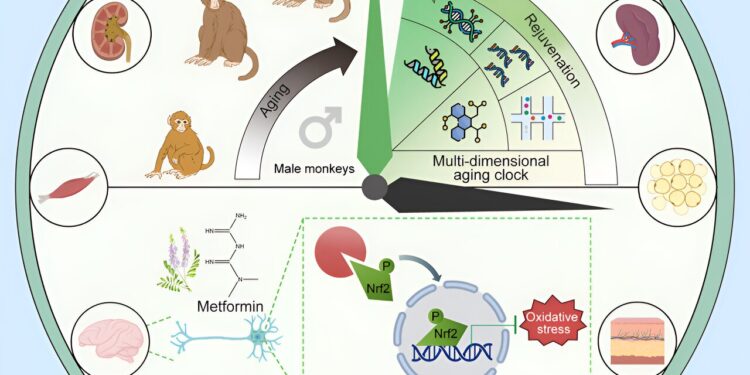Graphic summary. Credit: Cell (2024). DOI: 10.1016/j.cell.2024.08.021
A team of biologists affiliated with several institutions in China, working with a colleague in the United States, has found that giving cynomolgus monkeys the diabetes drug metformin can reduce aging in several organs, including the brain.
In their article published in the journal CellThe group describes their nearly four-year study of the impact of metformin on the body that they conducted with several cynomolgus monkeys and what they learned from them.
Previous research and anecdotal evidence have suggested that metformin, a drug traditionally used to treat patients with type 2 diabetes, has some degree of anti-aging component. Studies involving the drug being given to rodents, flies, and worms have shown signs of rejuvenation, and people taking the drug long-term have also reported feeling younger the longer they took the drug. In this new initiative, the research team conducted a 40-month study designed specifically to learn more about the drug’s impact on biological age in mammals.
The team administered the drug daily to 12 old male cynomolgus macaques and 18 other cynomolgus monkeys for 40 months. Before and periodically throughout the study, the researchers took tissue samples from several organs, took images of their brains, and performed physical and mental tests to monitor any changes in their biological age down to the cellular level.
The research team found a slowdown in biological aging in many organs, including the kidneys, lungs and skin. They also found that the organ that appeared to benefit most from this phenomenon was the brain.
All of the monkeys saw their age-related decline slow, some so much so that their neural activity resembled that of a similar monkey six years younger. Looking more closely at how the drug might help slow age-related brain decline, the researchers found that it activates cells that produce a protein called NRF2, which previous research has shown protects against cell damage during bouts of inflammation.
The research team acknowledges that their study was limited by its single-sex focus, its duration and the number of monkeys involved, and therefore suggests that a much larger and longer study be undertaken, which would include human testing.
More information:
Yuanhan Yang et al, Metformin slows the aging clock in male monkeys, Cell (2024). DOI: 10.1016/j.cell.2024.08.021
Cell
© 2024 Science X Network
Quote:Metformin reduces organ aging in male monkeys (2024, September 13) retrieved September 13, 2024 from
This document is subject to copyright. Apart from any fair dealing for the purpose of private study or research, no part may be reproduced without written permission. The content is provided for informational purposes only.



